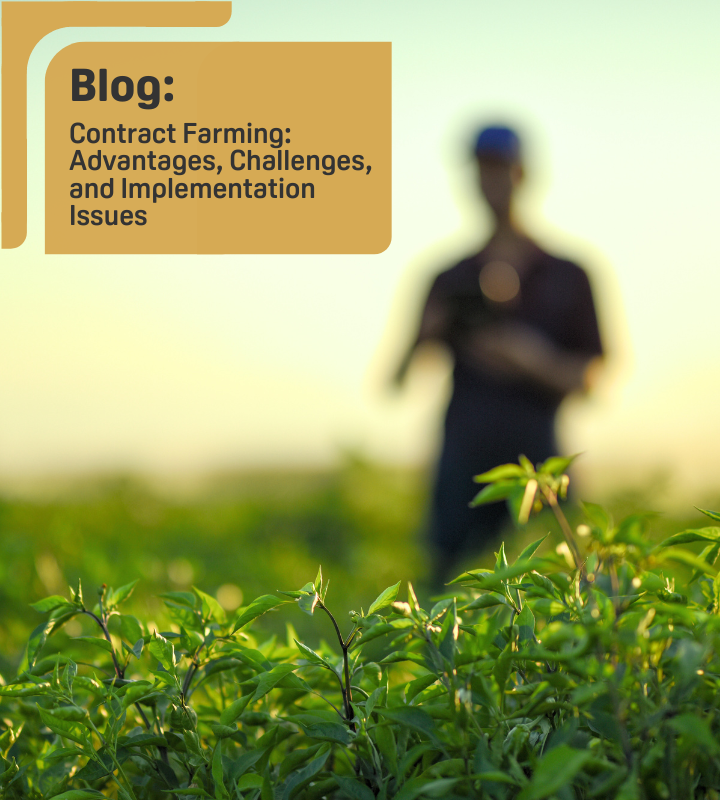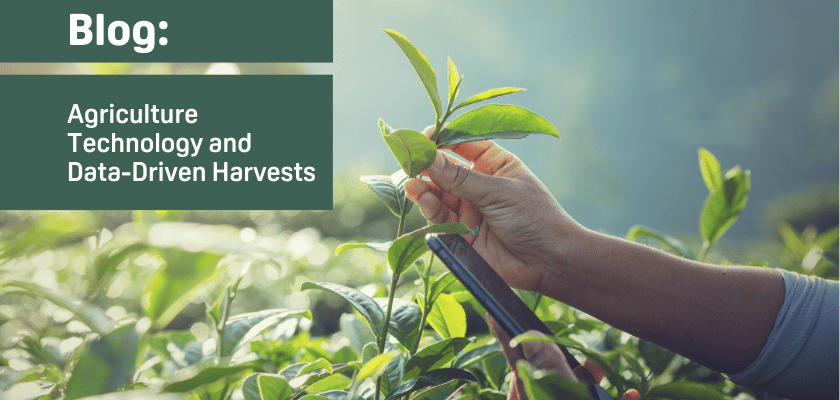

Contract Farming: Advantages, Challenges, and Implementation Issues
Contract farming mitigates risks for both parties, enabling more comprehensive market access to small-scale farmers and ensuring consistent raw material supply for agribusiness companies who agree to procure a pre-defined percentage of their raw materials from the farmers they have a contract with and procure the rest from the availability in the market. Contracting plays a crucial role in enhancing agricultural productivity and supply chain efficiency.
Published on 02 February 2024
Contract Farming: Advantages, Challenges, and Implementation Problems
Contract farming is a common practice in the agricultural industry, where agricultural producers, typically small-scale farmers, and agribusiness companies make a mutually beneficial arrangement. It involves a legally binding contract that outlines the terms and conditions of agricultural production and marketing. Under these agreements, farmers receive support such as seeds, fertilizers, and technical guidance from the agribusiness company, which helps them meet quality and quantity standards. In return, farmers commit to producing crops according to the agreed-upon specifications.
Contract farming mitigates risks for both parties, enabling more comprehensive market access to small-scale farmers and ensuring consistent raw material supply for agribusiness companies who agree to procure a pre-defined percentage of their raw materials from the farmers they have a contract with and procure the rest from the availability in the market. Contracting plays a crucial role in enhancing agricultural productivity and supply chain efficiency.
Contract farming aims to achieve closer vertical coordination and shared control over production and marketing decisions. This approach offers numerous advantages but presents challenges and implementation problems, which we will explore in this blog.
Advantages of Contract Farming:
-
Addressing Market Imperfections: Contract farming reduces transaction costs associated with imperfect competition, externalities, and information asymmetry. Vertical integration can help reduce transaction costs and control production and marketing, enhancing efficiency.
-
Risk Reduction: Contract farming mitigates price volatility in inputs and outputs by establishing agreed-upon terms. It ensures the required quantity and quality of commodities, reducing production risk. Contracts enable coordination to address food safety concerns.
-
Changing Market Structure: Increasing demand for high-quality products and food safety encourages vertical coordination. Strict control from seed to table ensures traceability and quality assurance.
-
Conveying Quality Information: Contract farming facilitates the adoption of innovative technologies and efficient production practices. It helps convey quality information to consumers and ensures product consistency.
-
Industrialization and Development: Contract farming aids small family farms by providing capital and managerial support. It promotes the shift from subsistence farming to industrialized production, especially in developing countries.
-
Sustainability and Regulations: Environmental and health safety standards drive the use of vertical coordination in agriculture. Contract farming aligns with sustainable and economically viable agricultural practices.
The nature of crops and production technology plays a crucial role in implementing contract farming. Perishable and bulk products with inelastic input and output supplies will likely involve contractual relationships. However, contract farming also presents challenges:
Challenges and Implementation Problems:
-
Lack of Bargaining Power: Farmers often have less negotiating power compared to powerful buyers, leading to unequal contract terms. Individual farmers may struggle to secure favorable contract terms without intervention.
-
Economic Factors: Contract farming introduces its risks, including contract non-renewal after a growing dependency on the farmer side, abrupt termination, or a failure to meet contract standards. Producers may lose premium prices if they fail to adhere to contract requirements. Price fluctuations in the open market lead to uncertainty in contracts, potentially causing profit loss for both farmers and agribusinesses.
-
Incomplete Contracts and Non-Compliance: Contracts cannot foresee all contingencies, leading to uncertainties and disputes. Farmers may choose to sell their products outside of contracts or supply only a limited portion when alternative market prices rise. This behavior can strain relationships and disrupt supply chains.
-
Pre-season Planning and Contract Signing: Challenges arise in accurately predicting the required quantity of processed products for the upcoming year. There is difficulty in performing budgeting and raw material calculations effectively.
-
Advances and In-Kind Support: Complex calculations are needed to determine the type and amount of advances given to farmers. It's essential to ensure that advances, whether in cash or in-kind, are provided accurately to each field.
-
Harvest Season Management: The nature of the harvest season can be chaotic and challenging to manage efficiently. Coordination becomes difficult when multiple companies source from the same pool of produce during harvest.
-
Open Market Purchases: Challenges arise in matching contracted quantities with actual market availability. There is a lack of digital solutions for efficiently purchasing produce from the open market.
-
Field and Farmer Variability: Variability in rented fields and farmer practices makes it challenging to standardize operations and provide consistent support each year.
-
Measurement and Evaluation: Measuring and evaluating the performance of farmers and fields accurately can be challenging.
-
Delays and Quality Deterioration: Implementation issues such as delays in delivery or payment can disrupt contract farming relationships.
Doktar’s Solutions
At Doktar, we aim to target the cultural resistance against digitalization in the agricultural sector and build programs that address acute problems in contract farming. We provide a comprehensive digital solution and integration among various stakeholders through our program management expertise and our one-stop-shop product portfolio including our field sensors, pest trackers, remote field scouting services, and farm management platforms. Implementing digital platforms for data analysis, monitoring, reporting, and decision-making, we solve the coordination issues of agribusiness internally and on the field with their contracted farmers by providing a holistic approach.
-
Quality Consistency and Standards Compliance: Ensuring that agricultural products meet the buyer's quality standards and comply with regulations can be challenging. With Orbit Field Scout, producers and agribusinesses can monitor crop health in real-time using satellite imagery and ensure that products meet the required standards consistently.
-
Supply Chain Transparency: Lack of transparency in the supply chain can lead to mistrust between farmers and buyers. Doktar's program management platforms provide traceability and transparency, allowing all parties to track the production and distribution process in real-time.
-
Resource and Risk Management: Efficiently managing resources like water, fertilizers, and pesticides is crucial for sustainability and cost control. Our precision agriculture solutions, such as soil sensors and satellite imagery, can optimize resource use, reduce waste and environmental impact and provide early detection and management of these risks.
-
Payment Disputes and Pricing Transparency: Payment disputes can arise due to a lack of clarity on pricing mechanisms. Doktar's data-driven plantation area and yieldd insights based on CropMap can offer transparent, real-time information on market trends and crop quality, supporting fair pricing and reducing disputes.
-
Contract Enforcement and Compliance: Ensuring compliance with contract terms by both parties can be challenging without a reliable monitoring system. Doktar's program management platform can document and verify compliance with contract terms, including quality specifications and delivery schedules.
-
Access to Finance: Farmers often face difficulties in accessing finance due to perceived high risks by lenders. By providing data on crop performance and operational efficiency, we can help farmers demonstrate reduced risk and better manage their operations, making them more attractive to financiers
-
Technical Support and Knowledge Transfer: Farmers need continuous support in adopting new technologies and best practices. Doktar's platform offers access to expert advice and agronomic support, facilitating knowledge transfer and capacity building among farmers.
-
Environmental Sustainability: Addressing environmental concerns in contract farming requires effective management of inputs and practices. Doktar's solutions promote sustainable farming practices, helping farmers reduce their carbon footprint, replenish water resources and enhance biodiverstiy while maintaining productivity.
Contract farming serves as a valuable mechanism for improving agricultural efficiency, sustainability, and quality assurance. However, it also presents challenges, particularly regarding unequal bargaining power, contract complexities, and operational implementation issues.
By addressing these challenges, Doktar can help make contract farming more efficient, sustainable, and mutually beneficial for both farmers and buyers, harnessing the full potential of contract farming and ensuring a fair and prosperous agricultural sector.
For those interested in exploring how Doktar's innovative solutions can transform your agricultural practices, visit our website for detailed information on all our products. Stay updated with the latest developments by following us on Instagram and LinkedIn, where we share insights, tips, and updates about our technologies and their impact on modern farming.

Agriculture Technology and Data-Driven Harvests
The convergence of agriculture technology and data-driven solutions represents the next frontier of innovation in farming. With companies like Doktar leading the way, farmers can leverage these advancements to improve productivity, reduce environmental impact, and secure a more sustainable future for agriculture. Whether through precision agriculture, sustainable agriculture, or cutting-edge smart agriculture technology, the future of farming is bright, and data is at the heart of this transformation. Technology's positive impact on this future should inspire and motivate us all.

Integrating Crop Health Monitoring Systems for Better Farm Management
Crop health monitoring systems revolutionize modern agriculture by enabling real-time insights into plant health, reducing losses, and promoting sustainability. Tools like Doktar’s CropMap and Orbit integrate advanced technologies, empowering farmers with data-driven decisions. By enhancing efficiency and sustainability, these systems are essential for future-proofing agricultural operations.

Modern Agriculture: Innovative Solutions to Combat Global Food Insecurity
Modern agriculture combats global food insecurity with precision agriculture, sustainable practices, and biotechnology. Tools like IoT, automation, and crop innovations optimize resource use, enhance resilience, and ensure stable food supplies. By integrating smart technologies, agribusinesses address challenges like climate change and resource scarcity, paving the way for a sustainable food future.
